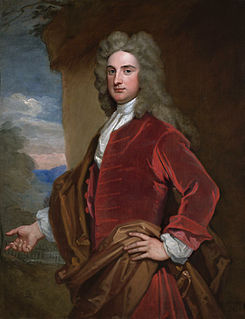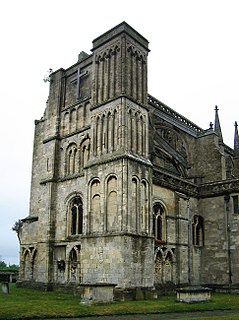Related Research Articles

Malmesbury Abbey, at Malmesbury in Wiltshire, England, is a religious house dedicated to Saint Peter and Saint Paul. It was one of the few English houses with a continuous history from the 7th century through to the Dissolution of the Monasteries.
William of Malmesbury was the foremost English historian of the 12th century. He has been ranked among the most talented English historians since Bede. Modern historian C. Warren Hollister described him as "a gifted historical scholar and an omnivorous reader, impressively well versed in the literature of classical, patristic, and earlier medieval times as well as in the writings of his own contemporaries. Indeed William may well have been the most learned man in twelfth-century Western Europe."

Earl of Suffolk is a title that has been created four times in the Peerage of England. The first creation, in tandem with the creation of the title of Earl of Norfolk, came before 1069 in favour of Ralph the Staller; but the title was forfeited by his heir, Ralph de Guader, in 1074. The second creation came in 1337 in favour of Robert de Ufford; the title became extinct on the death of his son, the second Earl, in 1382. The third creation came in 1385 in favour of Michael de la Pole. The fourth creation came in 1603. Lord Thomas Howard was the second son of Thomas Howard, 4th Duke of Norfolk, by his second marriage to Margaret, daughter and heiress of the Thomas Audley, 1st Baron Audley of Walden. Howard was a prominent naval commander and politician and served as Earl Marshal, as Lord Chamberlain of the Household and as Lord High Treasurer. In 1597 he was summoned to Parliament as Baron Howard de Walden, and in 1603 he was further honoured when he was created Earl of Suffolk. His second son the Hon. Thomas Howard was created Earl of Berkshire in 1626.
Earl of Malmesbury is a title in the Peerage of Great Britain. It was created in 1800 for the diplomat James Harris, 1st Baron Malmesbury. The son of the grammarian and politician James Harris, he served as Ambassador to Spain, Prussia, Russia and France and also represented Christchurch in the House of Commons. Harris had been created Baron Malmesbury, of Malmesbury in the County of Wiltshire, in 1788. He was made Viscount FitzHarris, of Hurn Court in the County of Southampton, at the same time as he was given the earldom. The earldom and viscountcy were the last creations in the peerage of Great Britain, future titles being made in the peerage of the United Kingdom which took effect three days later.
William Palmer may refer to:

North Wiltshire is a constituency represented in the House of Commons of the UK Parliament since 1997 by James Gray, a Conservative. In the period 1832–1983, this was an alternative name for Chippenham or the Northern Division of Wiltshire and as Chippenham dates to the original countrywide Parliament, the Model Parliament, this period is covered in more detail in that article. In 2016 it was announced that the North Wiltshire constituency would be scrapped as part of the planned 2018 Constituency Reforms.

This is a list of the Sheriffs and High Sheriffs of Wiltshire.
Malmesbury was a parliamentary borough in Wiltshire, which elected two Members of Parliament (MPs) to the House of Commons from 1275 until 1832, and then one member from 1832 until 1885, when the borough was abolished.

Sir John Rushout, 4th Baronet, of Northwick Park, Worcestershire was a British Whig politician who sat in the House of Commons for 55 years from 1713 to 1768. He was a supporter of Pulteney in opposition to Walpole, and was briefly part of an Administration. He was Father of the House from 1762.
Events from the 1120s in England.
Events from the 1070s in England.

The Tetbury Avon, also known as the Little Avon or the Ingleburn, is a tributary of the Bristol Avon. It is also referred to as the River Avon . It rises at Tetbury in Gloucestershire in the West Country of England, and flows in a generally south easterly direction, joining the Sherston Avon at Malmesbury in Wiltshire. The water flow has been reduced by public water extraction from its source aquifer in the Cotswold Hills. In the past watermills were used for fulling wool and grinding corn. One working mill survives.
The Gesta Pontificum Anglorum, originally known as De Gestis Pontificum Anglorum and sometimes anglicized as The History or The Chronicle of the English Bishops, is an ecclesiastical history of England written by William of Malmesbury in the early 12th century. It covers the period from the arrival of St Augustine in AD 597 until the time it was written. Work on it was begun before Matilda's death in 1118 and the first version of the work was completed in about 1125. William drew upon extensive research, first-hand experience and a number of sources to produce the work. It is unusual for a medieval work of history, even compared to William's other works, in that its contents are so logically structured. The History of the English Bishops is one of the most important sources regarding the ecclesiastical history of England for the period after the death of Bede.

Malmesbury is a town and civil parish in Wiltshire, England. As a market town it became prominent in the Middle Ages as a centre for learning focused on and around Malmesbury Abbey, the bulk of which forms a rare survival of the dissolution of the monasteries. Once the site of an Iron Age fort, in the Anglo-Saxon period it became the site of a monastery famed for its learning and one of Alfred the Great's fortified burhs for defence against the Vikings. Æthelstan, the first king of all England, was buried in Malmesbury Abbey when he died in 939.
Giles Earle, was a British Army officer and politician who sat in the House of Commons for 32 years from 1715 to 1747. He had a reputation as a wit.
William Stumpe of Malmesbury, Wiltshire, was a clothier and an English politician.
Sir James Stumpe, of Malmesbury and Bromham, Wiltshire, was an English clothier and Member of Parliament.
William Earle (1728–1774) was a British office holder and politician who sat in the House of Commons briefly in 1774.
William Rawlinson Earle, of Eastcourt House, Crudwell, near Malmesbury, Wiltshire, was a British politician who sat in the House of Commons for 40 years between 1727 and 1768.
William Chaloner was member of Parliament for Malmesbury for the parliament of 1393.
References
- ↑ PALMER, William II, of Malmesbury, Wilts. The History of Parliament. Retrieved 13 October 2018.